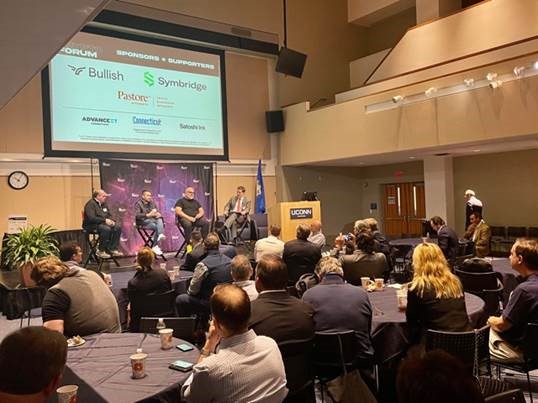Cryptocurrency (“Crypto”) is a virtual form of currency that functions through a decentralized system to record transactions and uses encryption, rather than an entity such as a bank, to verify transactions.[1] Crypto’s first mark on the digital world was in 2009 through Bitcoin, which remains the best-known form of Crypto today.[2] Crypto is created through a process known as mining, which involves downloading a unique software that contains all transactions that have taken place through that specific network.[3]
Crypto has had a profound effect on the global economy and has altered our world’s view of currency and financial transactions in general. Any investor with access to the internet can purchase cryptocurrency.[4] Additionally, over 15,000 businesses worldwide now accept Crypto as a form of payment, which has altered the availability of transactions to interested purchasers.[5] A study conducted by Forester Consulting on Crypto using the Total Economic Impact methodology demonstrated that 40% of customers that used Crypto as their form of currency were new customers to the merchant, evidencing intriguing information that Crypto is affording access to new transactions to new demographic groups.[6]
Despite the numerous advantages that Crypto has offered globally, Crypto’s high demand comes at the cost of an impact on our environment, which is currently being addressed at a federal executive level. The process of mining all Crypto was initially designed to be capped at 21 million units; however, the number of units available to mine has caused an increase in computation power exerted in order to mint new units of Crypto.[7] The estimated carbon footprint stemming from a single crypto transaction is estimated to burn 2,292.5 kilowatt hours of electricity, which equates to the amount of power the average U.S. household uses over the course of 78 days.[8] No payment system is foolproof in completely abolishing its carbon footprint and CO2 emissions. However, compared to VISA, which is another payment system, the average Crypto transaction requires 200,000 times more energy consumption.[9]
The substantial footprint of Crypto is acknowledged by the current administration, which has prioritized climate change mitigation. [10] In an Executive Order on “Ensuring Responsible Development of Digital Assets” which took place on March 9, 2022, United States President Joe Biden addresses the resulting environmental pollution from Crypto and Crypto mining and implements a plan alongside many federal agencies such as the Environmental Protection Agency.[11] The Executive Order recognizes the benefits of Crypto financial markets for consumers, investors, and businesses, however addresses the responsibility the United States has to mitigate contributions to climate change and pollution.[12]
To reach these goals and assure that Crypto’s harms to not outweigh its benefits, and to learn more about how to stray away from harms, the Executive Order calls on the Director of the Office of Science and Technology Policy to prepare a report to the President within 180 days, specifically addressing “the connections between distributed ledger technology and short-, medium-, and long-term economic and energy transitions; the potential for these technologies to impede or advance efforts to tackle climate change at home and abroad; and the impacts these technologies have on the environment…The report should also address the effect of cryptocurrencies’ consensus mechanisms on energy usage, including research into potential mitigating measures and alternative mechanisms of consensus and the design tradeoffs those may entail.[13]
The damages Crypto could potentially have large effects on climate change and the state of our environmental crisis. However, mitigating Crypto pollution is not an impossible feat. Government encouragement in developing sustainable technologies can have social and economic benefits to the Crypto market and remove the serious threat that Crypto can pose to the emission of greenhouse gases and its carbon footprint.[14]
[1]What is Cryptocurrency and How Does it Work?, Kaspersky, “https://www.kaspersky.com/resource-center/definitions/what-is-cryptocurrency”>https://www.kaspersky.com/resource-center/definitions/what-is-cryptocurrency (Last visited March 17, 2022)
[2]Id.
[3] Jake Frankenfield, Cryptocurrency, Investopedia (Jan. 11, 2022) https://www.investopedia.com/terms/c/cryptocurrency.asp#:~:text=Cryptocurrencies%20are%20generated%20by%20mining,have%20occurred%20in%20its%20network.
[4] Jim Probasco, What to Know About Investing in Crypto Exchanges, Investopedia (Nov. 30, 2021) https://www.investopedia.com/buying-and-selling-4689764
[5]Who Accepts Bitcoin and Ether Cryptocurrencies, Currency Exchange International (May 12, 2021) https://www.ceifx.com/news/who-accepts-bitcoin-and-ether-cryptocurrencies#:~:text=More%20than%2015%2C000%20businesses%20worldwide,Microsoft%2C%20AT%26T%2C%20and%20Wikipedia.
[6]Forrester Study Shows Accepting Crypto Attracts New Customers and Boosts AOV, Forrester (Aug. 6, 2020) https://bitpay.com/resources/forrester-report-says-bitpay-adds-new-sales-and-2x-aov/
[7] John Bogna, What is the Environmental Impact of Cryptocurrency? PCMag (Jan. 8, 2022) https://www.pcmag.com/how-to/what-is-the-environmental-impact-of-cryptocurrency#:~:text=The%20environmental%20concern%20comes%20from,household%20for%20over%2078%20days.
[8]Id.
[9]Bitcoin Energy Consumption Index, Digiconomist (2022) https://digiconomist.net/bitcoin-energy-consumption
[10] Executive Order on Ensuring Responsible Development of Digital Assets (Mar. 9, 2022), https://www.whitehouse.gov/briefing-room/presidential-actions/2022/03/09/executive-order-on-ensuring-responsible-development-of-digital-assets/.
[11] Executive Order, § 5(b)(vi)
[12] Executive Order, § 1
[13] Executive Order, § 5(b)(vii)
[14] Jon Truby, Decarbonizing Bitcoin: Law and Policy Choices for Reducing the Energy Consumption of Blockchain Technologies and Digital Currencies, 44 Energy Rsch. Soc. Sci. 399 (2018) (Discussing the benefits of Crypto and how the harms can be avoided through commitment to positive government intervention choices).










